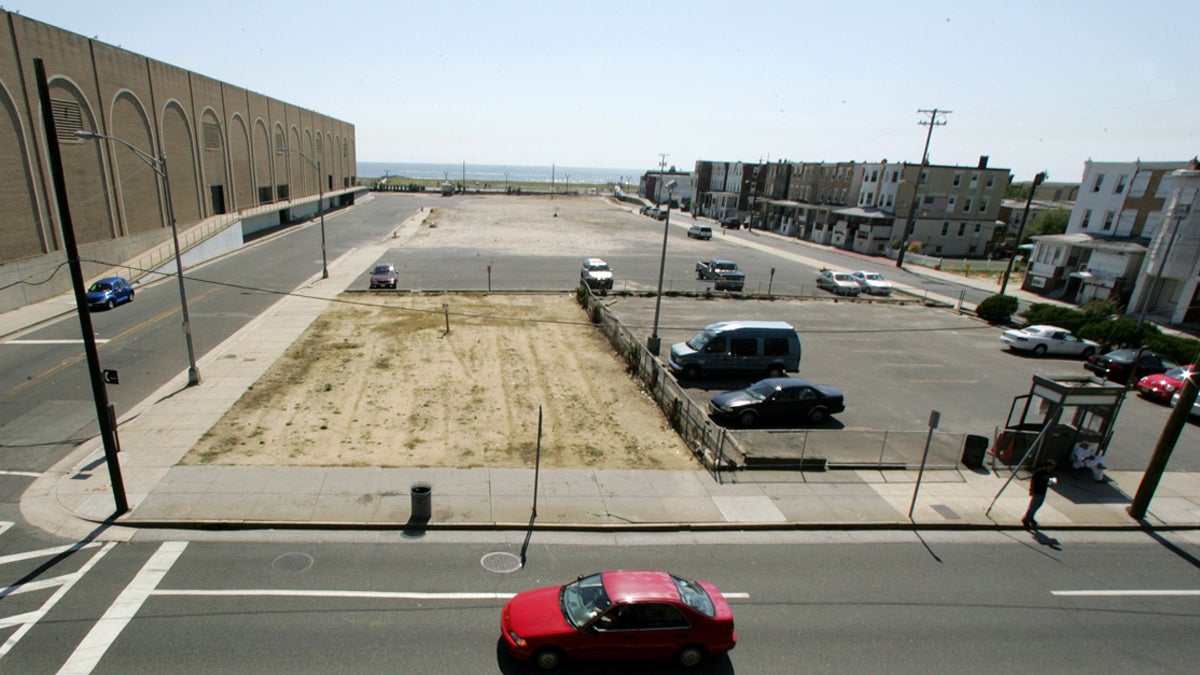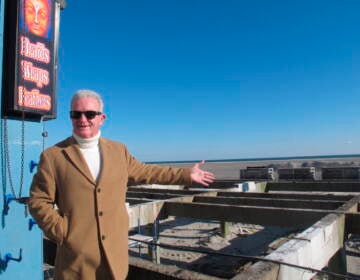Developers move to rebuild Atlantic City beyond casinos’ shadow

Cars drive by a vacant 2.5-acre lot in Atlantic City, N.J. (Mel Evans/AP Photo)
Atlantic City planning officials are examining ways to leap past the tarnished legacy of the casino industry and attract new residents.
On Wednesday, the city’s planning department is holding a public forum with several developers who are working on new apartment and condo buildings.
According to the city, more than 600 new housing units are in some stage of development in Atlantic City. “What will it take for you to live or buy a second home in AC?” is the question posted by Wednesday’s forum
Developers point to Atlantic City’s new business-friendly Mayor Don Guardian as a hopeful sign. Guardian supports tax abatements and other kinds of public incentives to lure new business, especially noncasino projects. He’s declared that turning Atlantic City’s economy around is a priority.
Last year saw the closure of four of Atlantic City’s 12 casinos, costing thousands of jobs and sinking property tax revenue.
Still, Philadelphia developer John Longacre thinks Atlantic City is worth betting on.
He’s planning about 30 apartment units in a former government building last occupied in 2008. He thinks there is ample demand for more housing there. If his hunch is right, he said, he’ll be planning even more residential dwellings.
“The casino industry has held Atlantic City hostage for the last 25 years, and now that they’re closing, Atlantic City is breaking those shackles and moving forward,” Longacre said. “Atlantic City is just going to reinvent itself as a beach town that happens to have gaming, as opposed to a gambling town that has a beach.”
One effort to rebrand the Atlantic City image may have crumbled. A $30 million annual budget intended to promote the city through national tours and the “Do AC” slogan will instead be directed to the city’s plummeting tax base. The plan is pending a final vote by state lawmakers.
Tax woes aside, developer Longacre said once the city can attract more vibrant businesses, people will follow. He said his project will feature a ground-level restaurant or retail shop.
“Increasing the year-round population is really going to be the key to fixing Atlantic City. But you’re not going to fix the year-round population unless you put in businesses that people want to go to,” Longacre said.
“People from 22 to 50, say, are not necessarily looking to go to a casino every weekend. But they would go to a good restaurant, a good retail store, or a yoga studio. Amenity-based businesses that just don’t exist in Atlantic City right now.”
Not every real estate observer is bullish on Atlantic City’s prospects. Philadelphia real estate agent Mickey Pascarella said that sparking a revival in the oceanfront city will be challenging, as rates of unemployment, poverty and crime all remain high — and that’s in addition to what some consider to be the most obstacle hurdle.
“You’re fighting the fact that people don’t love casinos, that your target audience doesn’t love casinos. And at the same time, the city is on a downward spiral in terms of casino employees and casino footprint,” Pascarella said. “So you’re going to be losing revenue and residents from the city at a time when you’re trying to move it forward.”
WHYY is your source for fact-based, in-depth journalism and information. As a nonprofit organization, we rely on financial support from readers like you. Please give today.




